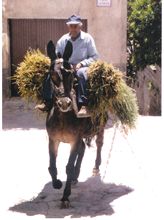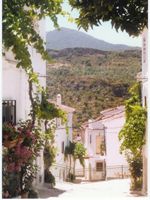From Chiswick to Andalucia
Dominique Levack on living in a place with genuine tapas and only two estate agents
| Sign up for our free weekly newsletter Comment on this story on the
Andalucia's integrated transport policy
Rush hour in Durcal Have you moved away from Chiswick to sunny climes? Or have you arrived here from another part of the world. We'd love to hear from you. Contact editor@chiswickw4.com
|
On the 17th
September last year I left my lovely garden flat in Chiswick and traveled
by car with my 2 children to live in Andalucia, southern Spain. I condensed
our worldly belongings into 8 boxes which arrived within 3 weeks, and
crammed all the other necessary stuff into a small trailer which accompanied
us across 3000 miles of Europe. The journey took us through France, across
the Pyrenees, down through northern and eastern Spain, and into the province
of Granada, where we settled in the town of Durcal.
Much like Chiswick is to London, Durcal is a satellite town of Granada.
Only 25 mins away by car (35 kms) it has a population of apprx 6500. Set
in the foothills of the Sierra Nevada, Durcal is backed by mountains,
snow capped in winter, greenly carpeted with olive and orange groves in
summer.
Like many Spanish towns it still retains alot of the old original whitewashed houses and narrow streets and it's a common sight to see donkeys (burros) carrying huge wicker baskets filled to the brim with fresh produce from the fields (campos.)
Similar to Chiswick, Durcal has one long high street where all the action is. Many bar-cafes, a cinema, 2 estate agents and a church. On Wednesday there is a market where you can buy anything from cheese, olives and spices to pirated cd´s, cool clothing, leather boots and bags and freshly roasted chickens basted in local wine for 6 euros (4 pounds). Unlike Chiswick's trendy chic café society, everyone here drinks coffee. It's not unusual to see the local bobby grab a coffee alongside a group of labourers.
The Spanish like a drink, and often start around 11am with a liqueur, followed by several small beers (cañas) for lunch. Its customary here in Andalucia to have tapas with any beer, which is a small plate of something to accompany your drink. This serves 2 excellent purposes, firstly you donít get so drunk when you are eating, and secondly it keeps you in the bar! Tapas can be anything from a mini pizza, to pork casserole and bread.
Café Florida is our equivalent of Coffee Republic. Young mums chat together after the morning aerobic class with Diago the Instructor, while much business is being done by the men. A coffee plus a delicious tomato and olive oil toastada will set you back 1.50 euros (1 pound). My favourite vice is to sit in my friend's café where she deep fries long donuts (chorros) and serves them with chocolate custard. The nightlife in Durcal is somewhat different to Chiswick. For a start nothing really opens until 10pm, and no-one goes anywhere until 11pm. On the way out of Durcal you will find 6 discos, all within 100 yards of each other. The word ďclubĒ here has brothel connotations, as I found out to my embarrassment one night, and there are several of those here too! Sadly the music leaves a little to be desired, as the young Spanish locals are all into old school, rather bad techno. However there is Bar Havana which puts on live music every Saturday, ranging from Flamenco to Oriental dancing, and comedy nights.
A beer will
cost you 2 euros (1.50 pounds) and a Bacardi and coke 4 euros (2.75 pounds).
In the summer there was the infamous Durcal Fiesta when the streets were
lined with stalls, a fair ground was installed in the car park, and all
the bars were packed with people spilling out onto the streets until 6
or 7am.
My children go to the local school, and have quite brilliantly picked
up the language very quickly. They are the only English kids in their
classes, but there are 3 others in the school. I find it frustrating communicating
with the teachers, because of my poor Spanish, but itís a good incentive
to learn quicker. The school is not so well equipped as Belmont, and the
creative side of the education leaves a little to be desired, but the
children look happy, are well behaved, and all have exceptionally neat
handwriting.
One of the best things about being here is the safety factor. There simply is so little crime, its safe for the kids to roam about freely. I can leave my son to play football in the park until dark, knowing he´s ok. Front doors are left open to encourage neighbours to pop in, and I never lock my car. The sense of community is also strong, and I am constantly overwhelmed by how many of our neighbours bring us fresh vegetables or flowers.
So was it worth the upheaval? I would say for us, yes! I believe our quality of life is better, although I do miss certain things like good TV, the choice of foods you can buy in W4, The Bedlington Thai Café, and charity shops. When Durcal gets too sleepy I can spend time in Granada watching gypsies singing and dancing flamenco in caves, wander around the old bars and cobbled streets of Sacromonte, and of course there's the Alhambra Palace. 20 minutes from Granada, high up in Sierra Nevada Mountains there are a number of excellent and reasonably priced ski resorts, even if you donít like the sport the views are spectacular.
My Mum loved it here so much, this year she sold her 2 bedroom flat in Shepherds Bush and moved to the seaside town of Salobreña, where she is now working part-time and thinking of opening a B&B. Average prices for a 4 bedroom house in Durcal start at 60-70,000 euros, around 40,000 pounds, and renting the equivalent around 300 euros per month (200 pounds). Nearer the coast or in Granada it gets more expensive, but on the whole, you get a lot more house for your money! However the average wage for locals here is 200 euros a week, so its relative.
As foreigners, you have to be versatile to survive here. Having a private income or pension one could live here easily, enjoying the 8 months of constant sunshine and more open way of life. Finding work here is more difficult, unless you speak fluently or have specialist skills. I work as DJ and producer, and have been lucky so far, but many people find after the initial honeymoon period has worn off, they can´t earn a living, and return to blighty. Living in another country is always exciting, you never know what´s going to happen, it keeps you on your toes. Last Saturday driving through Durcal I passed a man drinking outside a bar, on a horse. Not something you see alot in Chiswick!
Dominique Levack
October 31, 2003

